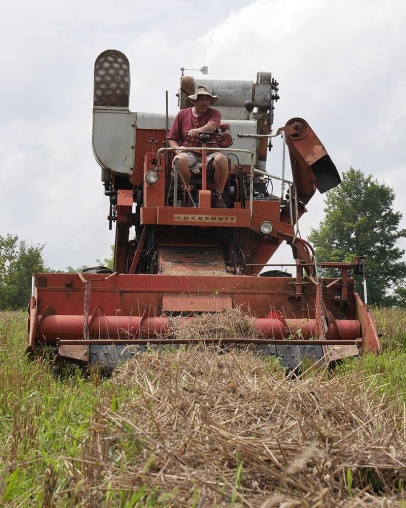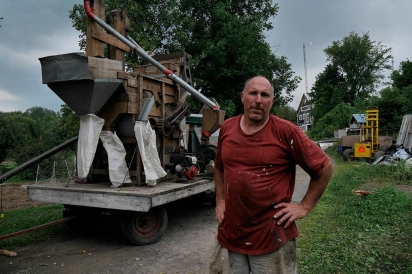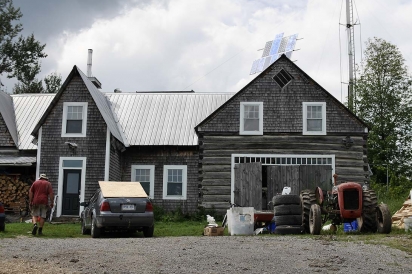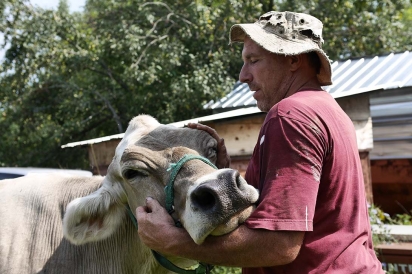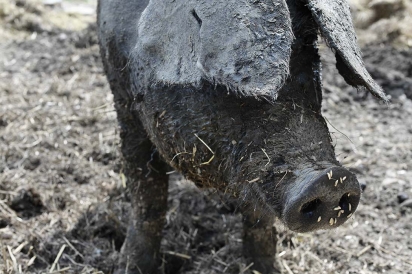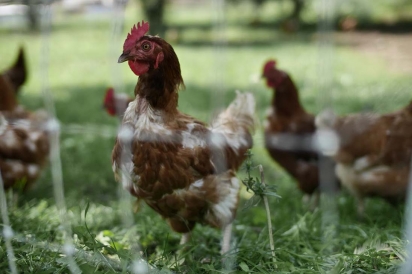The Wright Way
If the apocalypse comes, you might want to be George Wright, owner of Castor River Farm.
He’s surrounded by everything he’d need to survive — a loving family, hens and eggs, milk and honey, apples and soap and fifty acres of fertile land to grow organic grain. He’d power the works using his clever system of off-grid solar and wind energy and continue to feed his pigs the spent mash he gets from Dominion City Brewery. We all know that even in an apocalypse, somehow there would still be beer.
Wright specializes in growing organic grain on his third-generation family farm near Metcalfe, Ont. Surrounding his home, fields of buckwheat, rye, barley, triticale, flax, spelt and Red Fife wheat sway gently in the breeze.
For 15 years, like his fellow grain growers, Wright was content to sell his soybeans and wheat to the local grain elevator. However, a bit more than a decade ago, that became increasingly difficult. The grain elevator stopped buying wheat and his alternate buyer rented its space to an ethanol plant. Wright had to find a new market. In 2006, he started selling his grain directly to consumers at farmers’ markets.
The change was good. He’d never taken much satisfaction from selling to a mill. “Even though it was lucrative, it just wasn’t fulfilling” — nowhere near as satisfying as the weekly jolt he gets from conversations with market customers.
“I believe the phrase ‘farmers feed cities’ should be ‘farmers need cities.’ I need a relationship with my customers and I hope they find it as fulfilling as I do,” he says.
Indeed, Wright's simple, no-frills stand at the weekly farmers’ market at Lansdowne is always surrounded by friends and loyal customers and buzzing with conversation.
Of 25 local grain growers, he is one of five selling directly to consumers. His best seller is rolled oats, which are sure to hook any-one who tastes them. His secret? They’re rolled raw, giving them a unique, clean flavour. It doesn’t hurt that they’re also gluten-free, thanks to the way he grows and processes them.
“I stumbled on raw rolled oats,” says Wright. This discovery was partly thanks to his mentor, 90-year-old Joe Stachon, a recently retired farmer. Stachon had an old oat roller in his barn. “You’re growing hulless oats, why don't you try rolling them?” Stachon asked his friend. Wright was skeptical. He thought one had to steam and toast oats before rolling them, but that turned out to be false. The toasting and steaming just increases shelf life — at some cost to the taste and nutritional value. “Once people taste my raw rolled oats, they understand the difference,” says Wright. “Oat connoisseurs find they taste better.”
Of course, customers should make allowance for the reduced shelf life. Wright recommends buying his products the same way you would buy anything perishable, a bit at a time and often.
There’s strong evidence that fresher grains and flour are healthier.
That's why Wright mills his grains into flour while his customers wait. A kernel of wheat is rich in nutrients, such as vitamins B and E, protein, iron and antioxidants and most of the nutritional value is housed in the outer layers — the germ and bran. As soon as the wheat is milled into flour, the nutrients in that protective layer, which are sensitive to light, oxygen, temperature and humidity, are exposed to the elements and start to decay.
Many producers appear to find Wright’s approach worth emulating. He’s frequently invited to give farm talks about his raw oats production methods to eager audiences in the U.S.
Innovative thinking, nurturing the land, an ethical approach to farming and giving back to the community — these are all tenets of organic farming that Wright practises assiduously. The philosophy to which he subscribes is known as biodynamic farming, developed in the early 1920s by Austrian writer and social activist Dr. Rudolf Steiner, who believed in a holistic approach in which soil fertility, plant growth and care of livestock were closely connected contributors to sound ecology.
According to Steiner’s sometimes mystical thinking, even the moon influences soil and plant development. Wright therefore plants, cul-tivates and harvests according to the lunar cycle. “It’s another tool based on biodynamics that I use to combat the weeds and grow a better product,” he says. He also uses manure from his livestock for fertilizer and, unlike many farmers, never uses chemical sprays to kill weeds just before harvest.
Where some modern farms work the land with tractors guided by GPS and satellites, Wright uses simple, practical technology such as a manual pony harrow to cultivate his crops and a vintage seed cleaner to process his oats. He bought that sturdy beast at auction.
Almost all of the 20 or so pieces of equipment on his farm were manufactured in the 1960s. The oldest, his Forano grain cleaner, dates back to the 1920s.
Early in his farming career, unable to afford expensive new equip-ment, Wright traded his labour for the use of Stachon’s farm ma-chinery. He got more than equipment in the deal. Over the years, Stachon taught him the skills that gave him a rounded viability as a farmer — how to do bookkeeping, how to do one’s taxes, how to repair equipment and make do with the machinery one had. To this day, when he has a mechanical problem, Wright rolls up his sleeves and fixes things himself.
A strong work ethic and entrepreneurial spirit are family traits. His wife Kim MacMullin’s homemade soaps are popular at the Lansdowne Farmers’ Market. Lately, long lines have been forming beside Wright’s stand to buy son Rodney’s hearty “basic” and “fancy” grilled cheese sandwiches. He sets everything between fresh sourdough bread that his mom makes from the Red Fife wheat his dad grows. It’s a winning combination. Rodney’s sandwiches are so popular MacMullin is struggling to keep up with the ever-increasing demand for fresh bread. Lately, Rodney has surpassed his dad’s weekly revenue, and Wright couldn’t be prouder.
One thing Wright wants to offer more of at his market stand is pork, but his hopes have been hog tied by bureaucracy. He would like to work with modern butchers to process his pork to suit his customer's needs and tastes, but they can’t get licences to do so. Now, his pork goes through a two-week process that delivers product that he can’t reliably trace back to his own farm. Wright is working on this problem, petitioning government authorities to change the licencing regulations.
These days, butchering seems to be a take-it-or-leave-it scenario. "The older butchers are set in their ways and aren't open to innovation or modern ideas," says Wright. "It's frustrating because I can't offer my customers modern products like gluten-free sausages with customized organic casings and seasonings."
Some parts of government have been smiling on what Wright is doing, however. Two years ago, he and MacMullin won a Premier’s Award for Agrifood Innovation Excellence. The citation mentioned the couple’s “pioneering organic protocols for growing gluten-free grains, relying on carefully planned crop rotations and rigorous cleaning of machinery to keep their buckwheat and oats completely uncontaminated."
Modern farming, it seems, is a paradox — a delicate balancing act between the best of the past and the worst of the present.
With winter approaching and the harvest done, quiet has descend-ed on Castor River Farm, but that doesn’t mean Wright isn’t busy. He’s currently researching the feasibility of growing sorghum, pearl millet, amaranth and quinoa.
One thing’s for certain: Apocalypse or not, with Wright on the job, many people will be well fed.
Castor River Farm
2696 9th Line Rd. Metcalfe, Ont.
castorriverfarm.ca, 613.821.0807


